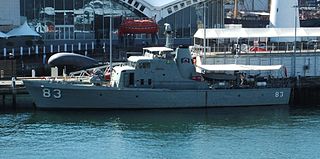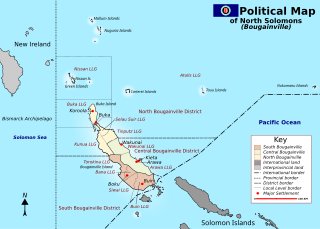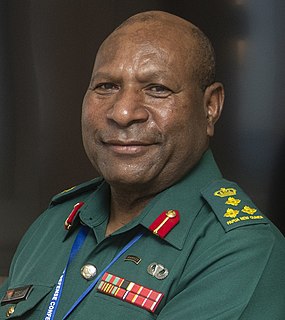Related Research Articles

The Papua New Guinea Defence Force (PNGDF) is the military organisation responsible for the defence of Papua New Guinea. It originated from the Australian Army land forces of the territory of Papua New Guinea before independence, coming into being in January 1973 and having its antecedents in the Pacific Islands Regiment. The PNGDF is a small force, numbering around 2,500 personnel, and consists of a Land Element, an Air Element and a Maritime Element. It is a joint force tasked with defending Papua New Guinea and its territories against external attack, as well as having secondary functions including national-building and internal security tasks.

Bougainville, officially the Autonomous Region of Bougainville, is an autonomous region in Papua New Guinea. The largest island is Bougainville Island, while the region also includes Buka Island and a number of outlying islands and atolls. The interim capital is Buka, although this is considered temporary, with the capital likely to move. One potential location is Arawa, the previous capital.

HMAS Aitape was an Attack-class patrol boat of the Royal Australian Navy (RAN). It was named for the small town of Aitape, Sandaun Province, Papua New Guinea. Completed in 1967, the vessel was one of five assigned to the RAN's Papua New Guinea (PNG) Division. The patrol boat was transferred to the Papua New Guinea Defence Force in 1974 as HMPNGS Aitape. She remained active until 1982, when she was removed from service for use as a parts hulk. Aitape was scuttled off Port Moresby for use as a dive wreck in 1995.

HMPNGS Lakekamu is Balikpapan-class landing craft heavy (LCH) operated by the Maritime Operations Element of the Papua New Guinea Defence Force (PNGDF). The vessel was one of eight built for the Royal Australian Navy (RAN) in the 1970s, and was commissioned into the RAN as HMAS Labuan in March 1973. Labuan was decommissioned in November 2014. She was transferred to the PNGDF for use as a training ship and was commissioned as HMPNGS Lakekamu in December 2014.

Bougainville, an autonomous region of Papua New Guinea (PNG), has been inhabited by humans for at least 29,000 years, according to artefacts found in Kilu Cave on Buka Island. The region is named after Bougainville Island, the largest island of the Solomon Islands archipelago, but also contains a number of smaller islands.
The Sandline affair was a political scandal that became one of the defining moments in the history of Papua New Guinea, and particularly the conflict in Bougainville. It brought down the government of Sir Julius Chan, and took Papua New Guinea to the verge of a military revolt. The event was named after Sandline International, a UK-based private military company force.

Jerry Singirok was the commander of the Papua New Guinea Defence Force throughout the Sandline affair of 1997.

The Royal Pacific Islands Regiment (RPIR) is an infantry regiment of the Papua New Guinea Defence Force (PNGDF). The regiment is descended from the Australian Army infantry battalions formed from native soldiers and Australian officers and non-commissioned officers in the territories of Papua and New Guinea during World War II to help fight against the Japanese. Disbanded after the war, the regiment was re-raised in 1951 as part of the Australian Army and continued to serve until Papua New Guinea gained its independence in 1975, when it became part of the PNGDF. Today, the RPIR consists of two battalions and has seen active service in Vanuatu, Bougainville and the Solomon Islands.

The 2012 Papua New Guinea Defence Force mutiny took place on 26 January 2012 when a group of military personnel headed by retired Colonel Yaura Sasa took the commander of the defence force, Brigadier General Francis Agwi, prisoner. The mutiny was related to a dispute over the prime ministership between Sir Michael Somare and Peter O'Neill which had begun in December 2011 when the Supreme Court of Papua New Guinea ordered that Somare be reinstated as the prime minister while the country's parliament supported O'Neill.

Brigadier General Francis Wanji Agwi, CSM, CBE, DSM (born ?) is a Papua New Guinean Army officer who served as the 9th Commander of the Papua New Guinea Defence Force.
Lombrum Naval Base, also known as HMPNGS Tarangau and formerly PNG Defence Force Base Lombrum, is a naval military base operated by the Maritime Operations Element of the Papua New Guinea Defence Force (PNGDF). It is located on Manus Island in Papua New Guinea. Lombrum is the home port of the PNGDF's Pacific-class patrol boat force.

The Bougainville conflict, also known as the Bougainville Civil War, was a multi-layered armed conflict fought from 1988 to 1998 in the North Solomons Province of Papua New Guinea (PNG) between PNG and the secessionist forces of the Bougainville Revolutionary Army (BRA), and between the BRA and other armed groups on Bougainville. The conflict was described by Bougainvillean President John Momis as the largest conflict in Oceania since the end of World War II in 1945, with an estimated 15,000–20,000 Bougainvilleans dead, although lower estimates place the toll at around 1,000–2,000.

Major General Gilbert Toropo CBE is a Papua New Guinean Army officer who is the current Commander of the Papua New Guinea Defence Force (PNGDF).
Edward Ramu (Ted) Diro GCL CBE is a Papua New Guinean politician and soldier.

The Guardian-class patrol boats are a class of small patrol vessels designed and built in Australia and provided to small South Pacific Ocean countries as part of the Australian Government’s Pacific Maritime Security Program.

HMPNGS Seeadler (P03) is one of four Pacific Forum patrol vessels operated by the Papua New-Guinea Defence Force.

HMPNGS Ted Diro (P401) is the first Guardian-class patrol boat to be completed. Australia designed and provided four Pacific Forum-class patrol vessels to Papua New Guinea in 1987 and 1988, and in 2015 confirmed she would be replacing those vessels with four larger, and more capable, Guardian-class vessels.

The Commander of the Papua New Guinea Defence Force is the highest-ranking military officer of in the Papua New Guinea Defence Force, who is responsible for maintaining the operational command of the military. The current commander is Brigadier general Gilbert Toropo.

HMPNGS Rabaul (01) was the first Pacific Forum patrol vessel to be commissioned, in May 1987. She is not the first vessel of the class to go out of service, because her sister ship from Fiji RFNS Kiro was wrecked in 2016. She arrived in Port Moresby, for disposal, on October 24, 2018. The vessel was named HMPNGS Tarangau.
Leo Nuia was an officer in the Papua New Guinea Defence Force.
References
- ↑ Keith Scott (16 March 1990). "In PNG a coup on the rocks". Canberra Times . p. 1. Archived from the original on 9 November 2020. Retrieved 8 November 2020.
- ↑ Norm Dixon (24 April 1991). "PNG invades north Bougainville". Archived from the original on 10 September 2020. Retrieved 9 November 2020.
In the days that followed, both Nuia and the commander of the PNGDF, Brigadier-General Rochus Lokinap, could not be located by the government, which claimed it did not know who ordered the action.
- ↑ Niki Raath (19 December 1991). "Moral Support? Australia's respons to Papua New Guinea's internal security problems" (PDF). Parliamentary Research Service . Archived (PDF) from the original on 4 March 2016. Retrieved 9 November 2020.
Brigadier General Rochus Lokinap was reinstated he immediately and successfully demanded thereplacement of Dataona by Colonel Leo Nuia.
- ↑ "Territory needs leaders, Brigadier tells cadets". Papua New Guinea Post-courier . International, Australia. 30 November 1970. p. 12. Retrieved 12 November 2020– via National Library of Australia.
- ↑ "Advertising". The Canberra Times . Vol. 62, no. 19, 067. Australian Capital Territory, Australia. 18 December 1987. p. 1. Retrieved 12 November 2020– via National Library of Australia.
- ↑ R.J. May; Viberto Selochan (2004). "The Military and Democracy in Asia and the Pacific". Archived from the original on 10 September 2018. Retrieved 8 November 2020.
- ↑ "Military-Civil Relations in the Independent State". Australian National University . Archived from the original on 10 September 2018. Retrieved 8 November 2020.
He was replaced by Colonel Rochus Lokinap. Lokinap was the first non-Papuan commander of the PNGDF, coincidentally coming from a village in Sir Julius Chan’s New Ireland electorate.
- ↑ "SUPPLEMENT TO THE LONDON GAZETTE, 11th JUNE 1988" (PDF). London Gazette . 11 June 1988. Archived (PDF) from the original on 13 February 2020. Retrieved 8 November 2020.